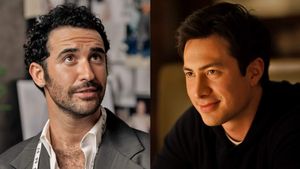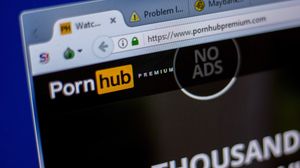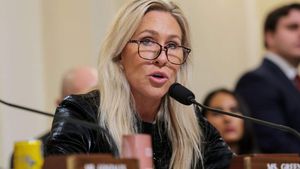The editor in chief and executive editor of Gawker both turned in letters of resignation Monday to protest CEO Nick Denton's decision to remove a lurid story that outed an executive who was allegedly being extorted by a male escort and gay porn star.
The latest development comes just days after Gawker founder and CEO Nick Denton apologized for the controversial story and removed it from the site -- allegedly without the input or approval of the editorial staff.
"Tommy Craggs, the executive editor of Gawker Media, and Max Read, the editor-in-chief of Gawker.com, are resigning from the company," reads a post published today on Gawker.
"Craggs and Read informed staff members that the managing partnership's vote to remove a controversial post ... -- a unprecedented [sic] act endorsed by zero editorial employees -- represented an indefensible breach of the notoriously strong firewall between Gawker's business interests and the independence of its editorial staff."
The post goes on to include the full copies of memos sent by Craggs and Read to Gawker's editorial staff, the writers and editors of Gawker.com, and the managing partnership of the site.
In his letter to the partnership group, Read was blunt about his feelings regarding the decision to take down the story, which claimed that a magazine executive, who The Advocate has chosen not to name, tried to hire a gay porn star for sex at a cost of $2,500. The story contained screenshots of text messages and photos that allegedly identify the man, who is married to a woman and has children.
"That this post was deleted at all is an absolute surrender of Gawker's claim to 'radical transparency'," wrote Read. "That non-editorial business executives were given a vote in the decision to remove it is an unacceptable and unprecedented breach of the editorial firewall, and turns Gawker's claim to be the world's largest independent media company into, essentially, a joke."
A statement "From the Gawker Media Editorial Staff" union published on Gawker's site Friday slammed the decision to remove the story:
"[Friday's] unprecedented breach of the firewall, in which business executives deleted an editorial post over the objections of the entire executive editorial staff demonstrated exactly why we seek greater protection. Our opinions on the post are not unanimous but we are united in objecting to editorial decisions being made by a majority of non-editorial managers. Disagreements about editorial judgment are matters to be resolved by editorial employees. We condemn the takedown in the strongest possible terms."
Another staffer's reply to that statement lends credence to Denton's initial remark that deciding to publish the story in the first place was a "close call" among editors in the newsroom.
"A large percentage of the Gawker Media editorial staff disagreed with Gawker's decision to publish the post to which this statement refers," wrote Gawker sportswriter Timothy Burke. "Our opposition to the removal of the post lies solely in the process by which that decision was made, not in regard to the content of the post itself."
By Monday afternoon, Gawker's founder responded to the growing unrest over the editorial decision -- after two of the members of Gawker's managing partnership issued statements indicating that Denton had ultimately advised the team to remove the story. That lengthy statement did indicate that any staffers who chose to resign on principle will be considered "constructive dismissal[s], subject to severance."
Find excerpt's of Denton's formal response below, or read all the internal correspondence surrounding the controversy in its entirety at Gawker.
Gawker CEO Nick Denton's letter reads in part:
"The Managing Partnership as a whole is responsible for the Company's management and direction, but they do not and should not make editorial decisions. Let me be clear. This was a decision I made as Founder and Publisher -- and guardian of the company mission -- and the majority supported me in that decision.
This is the company I built. I was ashamed to have my name and Gawker's associated with a story on the private life of a closeted gay man who some felt had done nothing to warrant the attention. We believe we were within our legal right to publish, but it defied the 2015 editorial mandate to do stories that inspire pride, and made impossible the jobs of those most committed to defending such journalism.
I'm sorry also that Jordan Sargent, reporting this story impeccably despite a personal drama, was exposed to such traumatizing hatred online, just for doing his job. And I'm sorry that other editors and writers are now in such an impossible position: objecting to the removal of a story that many of them found objectionable.
The company promotes truth and understanding through the pursuit of the real story -- and supports, finances and defends such independent journalism. That is and remains its mission, and this story was in violation of it.
We pride ourselves on pushing boundaries and know that every story requires a judgment call. There was strong internal disagreement on whether the right judgment was made. I believe it was not and could not defend it.
Were there also business concerns? Absolutely. The company's ability to finance independent journalism is critical. If the post had remained up, we probably would have triggered advertising losses this week into seven figures. ...
No, I was thinking in the broadest terms about the future of the company. The choice was a cruel one: a management override that would likely cause a beloved editorial leader to resign on principle; or a story that was pure poison to our reputation just as we go into the Hogan trial.
It was such a breach of everything Gawker stands for, actually having a post disappeared from the internet. But it was also an unprecedented misuse of the independence given to editorial. ...
We need a codification of editorial standards beyond putting truths on the internet. Stories need to be true and interesting. I believe we will have to make our peace with the idea that to be published, those truths should be worthwhile.
And some humane guidelines are needed -- in writing -- on the calculus of cruelty and benefit in running a story. Everybody has a private life, even a C-level executive, at least unless they blab about it. ...
The editorial ethos of Gawker needs a calibration more than a radical shift. Gawker needs to keep being Gawker. If you're wondering whether a more explicit editorial policy will turn us into some generic internet media company, I'd say no: I see Gawker Media occupying a space on the online media spectrum between a stolid Vox Media and a more anarchic Ratter; close to the edge, but not over it."





































































Charlie Kirk DID say stoning gay people was the 'perfect law' — and these other heinous quotes